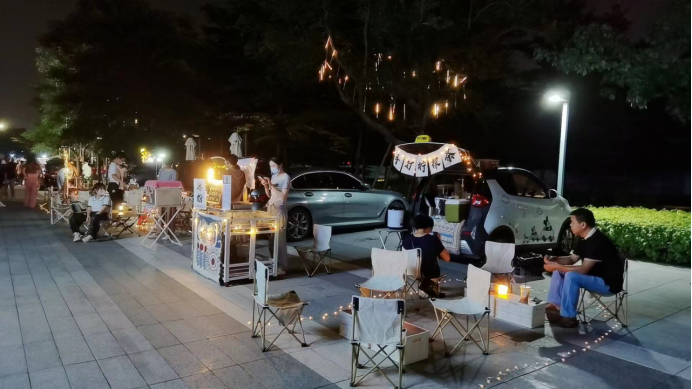Car boot fairs provide jobs, fun
Nightlife, business opportunities bounce back after outbreaks


"I want to convey an attitude that even though I am in debt, I will never 'let it rot'," Zhuang said.
The pair closed the milk tea shops they ran for about four years at the end of last year due to the instability caused by the epidemic. They found jobs this year at companies and go to the fair in their spare time.
"The popularity of the fairs shows that many people's incomes have been affected by the epidemic, but they don't want to 'lie flat' at home; instead, they work hard," he said.
Better regulation needed
On Sept 5, six government departments in Nanjing, Jiangsu province, jointly issued a notice on trial measures to support the healthy development of car boot fairs, the first of its kind in the country.
The emerging business form is conducive to expanding employment channels, stimulating market vitality and releasing potential consumer spending, the notice said.
The city will develop a number of sites suitable for hosting such fairs in business districts, commercial complexes, cultural and tourism scenic spots and villages, and encourage such markets to cooperate with short-video platform Douyin and lifestyle platform Xiaohongshu to strengthen brand building.
Hosting sites should be instructed to establish safety, sanitation, epidemic prevention and other protocols to protect the legitimate rights and interests of consumers and booth owners. The owners who sell food should comply with relevant laws and regulations on food safety.
The city will promote the establishment of a car boot fair alliance to act as a bridge between the government, enterprises and car owners, and to set regulatory standards, according to the document.
Zhuang welcomes regulations like issuing certificates for booth runners and arranging special locations for them. He recently started to share car trunk fair information and experience on social media in order to gather more stall runners and promote the industry's healthy development.
He said he plans to organize some communication activities for stall runners to share experience in Shenzhen and organize more professional boot sale fairs with live bands that target younger generations.
"It will be fun. We hope to become a bench mark of high quality in the industry," he said. "Without standards and regulation, customers will lose their appetite and the whole thing will disappear in a rush of wind."
Li, the coffee stall runner, also looks forward to supporting policies. Trunk fairs can solve sustenance issues for those who lost their jobs during COVID-19, and there is also market demand, however, they should be better regulated, including food security and sanitation supervision.
Li often called on other stall owners not to sell food overnight and organized them to clean up and pick up cigarette butts together when closing the fairs.
However, as autumn arrives in Xi'an and the temperature drops after several days of rain in September, Li can sense that the number of customers is dwindling.
"Before the rain, we closed at 3 am. Now we hardly have customers after midnight. The turnover is half of what it was before," he said.
"People used to sit here chatting overnight and wait for the sunrise. In summertime, the sunrise reflected on the water and it was very beautiful. But that's not happening in these cold evenings."
The declining temperature has forced Li to think about how to survive the coming winter as he predicts it's impossible to continue the business outside on winter nights.
zhangyi1@chinadaily.com.cn




































